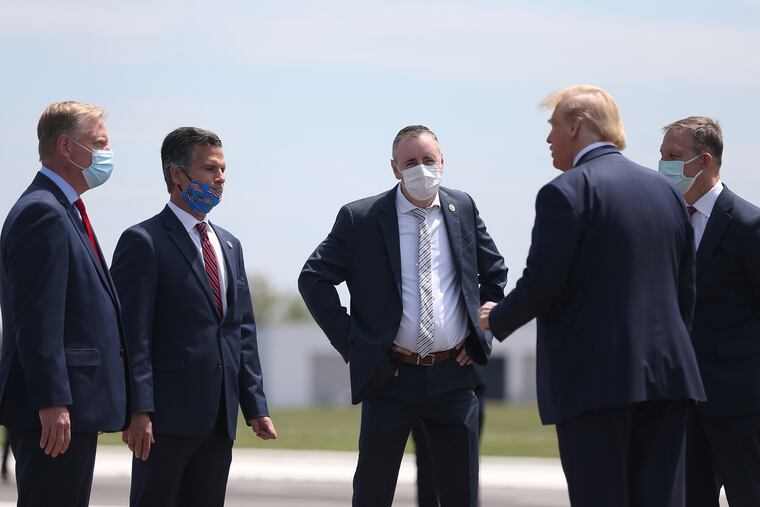Congress bailing out corporate lobbying groups is a terrible idea | Opinion
There is something fundamentally broken about a political institution that shows more bipartisan agreement about bailing out lobbying groups than extending benefits for struggling Americans.

Of all the priorities on which lawmakers can focus right now, bailing out corporate lobbying groups should be among the lowest. Yet, during this historic crisis, when millions have lost their jobs and health insurance, there are multiple bills in Congress to do just that.
Last month, Senate Republicans introduced their COVID-19 relief stimulus package, the HEALS Act. Tucked inside the legislation was a bill introduced by Sens. Susan Collins and Marco Rubio that would make 501(c)(6) organizations — i.e., lobbying groups — eligible for the Paycheck Protection Program (PPP), the forgivable loan program created by Congress to help small businesses and their workers get through the pandemic.
Proponents of such a bailout, such as Pennsylvania Rep. Brian Fitzpatrick — who co-introduced his own lobbying group bailout bill, HR 6697, in the House — tout the importance of ensuring that local chambers of commerce and regional 501(c)(6) organizations can continue “assisting our small businesses as they navigate through the COVID-19 crisis.” What Fitzpatrick and others fail to reveal is that many of the largest corporate lobbying groups in D.C. could also be eligible for a bailout in the proposals floating around Congress.
Under the Collins-Rubio bill, any 501(c)(6) with 300 or fewer employees could qualify for PPP loans. The Democratic Policy Center — an organization I cofounded — found that 99.8% of 501(c)(6) organizations meet this threshold, including PhRMA (Pharmaceutical Research and Manufacturers of America), D.C.‘s top lobby for drug manufacturers.
Based on our data, roughly 90% of 501(c)(6) groups have 20 or fewer employees. The only reason to maintain a 300 employee threshold is to allow the most powerful corporate lobbying groups — which bankroll congressional campaigns through political action committees — to get federal assistance.
An early draft of the GOP Senate bill limited PPP eligibility to those groups with 50 or fewer employees and capped their loans at $500,000 (with exceptions for chambers of commerce and destination marketing organizations). However, the American Society for Association Executives — quite literally a lobbying group for lobbying groups — has been actively lobbying Congress to make their members eligible and won a last-minute revision to remove these restrictions. ASAE is currently working to gut the bill’s final meaningful prohibition — that no group that spends more than 10% of its activities on lobbying can get a PPP loan. (The bill prevents loans from covering “lobbying activities,” but this is easily circumvented by moving money around.)
Unfortunately, the perceived need to bail out corporate lobbying groups has become widely accepted in Congress, cutting across partisan divides. Congressional Democrats included a massive lobbying group giveaway in their omnibus relief bill, the HEROES Act, in May.
It is truly inexcusable that Congress is considering bailing out the people who stuff their pockets with campaign cash, while millions of Americans teeter on the brink of financial catastrophe. The last thing America needs right now is for Congress to give its constituents more reason to believe donors and special interests matter more in Washington than everyone else.
» READ MORE: National groups come to the aid of Democrat challenging U.S. Rep. Brian Fitzpatrick in Bucks County
Yet, despite the absurdity of these bills, the effort to bail out lobbying groups has failed to attract significant media coverage, much to the benefit of the congressional leaders pushing it. After all, this bailout is incredibly unpopular.
According to polling conducted by Data for Progress for the Democratic Policy Center, 70% of Americans do not think it’s important for Congress to provide coronavirus relief funds to lobbying groups. Instead, they want to see relief for individuals and families, states and cities, and small businesses.
If the efforts in Congress to bail out corporate lobbying groups are successful, the blame should fall on congressional leadership. But anger should also be directed to the House members who pushed HR 6697 to extend PPP eligibility to any lobbying group with 300 or fewer employees. The bill garnered a bipartisan roster of 125 sponsors and effectively normalized the idea.
There is something fundamentally broken about a political institution that shows more bipartisan agreement about bailing out lobbying groups than extending unemployment benefits and guaranteeing health care during the worst crisis of our lifetimes. Deep reform of our political system is clearly needed — especially to reduce the influence of special interests. Until that reform is won, it’s up to citizens to tell Congress that bailing out corporate lobbying groups is a terrible idea.
Adam Eichen is a cofounder of the Democratic Policy Center and coauthor of “Daring Democracy” (Beacon Press 2017).